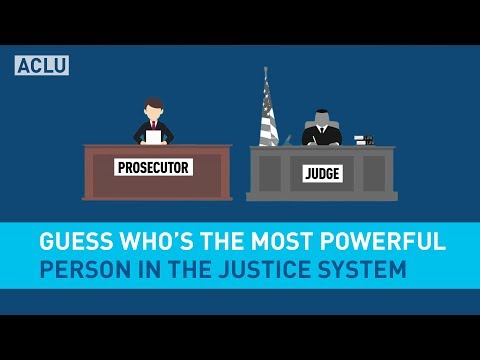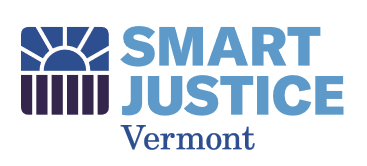The Power of Prosecutors
Elected prosecutors in Vermont are called State’s Attorneys, and they have enormous power over the lives of Vermonters entangled in the criminal justice system. They choose who gets charged and who is free to go, who gets diverted to treatment for substance use, and who goes to jail. They choose whether to seek the maximum or minimum sentence. They choose whether or not to prosecute police officers and government officials for misconduct.
The State’s Attorney is also an elected official, which means they are ultimately accountable to the voters. Given the enormous power prosecutors wield in Vermont’s criminal justice system, it is critical that voters know who their state’s attorney is and what decisions that person is making in their name.
Why is a State’s Attorney Powerful?
Day-to-day, State’s Attorneys make decisions that shape the lives of their fellow Vermonters forever. They decide whether or not to file criminal charges, and how many charges to file. In Vermont, 98% of criminal cases are resolved by a plea deal, which is a bargain written by the State’s Attorney, who decides what conditions – prison time, fines, community service, rehabilitation programs – they will offer in exchange for a guilty plea.
In the overwhelming majority of cases, State’s Attorneys, not judges, decide how many Vermonters go to prison, and for how long. State’s Attorneys decide if someone will go to prison for six months or six years, whether someone will receive pre-trial diversion for addiction treatment or receive the maximum possible sentence.
At the same time, State’s Attorneys do not currently release data on the decisions they make and who is impacted, making it harder to evaluate their crucial role in the criminal justice system.
State’s Attorneys also play a powerful role in the Vermont legislature. They, along with county sheriffs, are represented by a lobbying group that often testifies in support or opposition of criminal justice reform measures, and their voices carry considerable weight.
Who is my State’s Attorney?
Each county in Vermont has its own elected State’s Attorney. Here is a list of county prosecutors as of January 2023. Learn more about state's attorneys on the 2022 ballot.
| County | State's Attorney | Website | |
| Addison County | Eva Vekos | ||
| Bennington County | Erica Marthage | Contact | [email protected] |
| Caledonia County | Jessica Zaleski | Contact | [email protected] |
| Chittenden County | Sarah George | Contact | [email protected] |
| Essex County | Vincent Illuzzi | Contact | [email protected] |
| Franklin County | James Hughes | Contact | [email protected] |
| Grand Isle County | Douglas DiSabito | Contact | [email protected] |
| Lamoille County | Todd Shove | Contact | [email protected] |
| Orange County | Dickson Corbett | Contact | [email protected] |
| Orleans County | Farzana Leyva | Contact | [email protected] |
| Rutland County | Ian Sullivan | Contact | [email protected] |
| Washington County | Michelle Donnelly | Contact | [email protected] |
| Windham County | Tracy Kelly Shriver | Contact | [email protected] |
| Windsor County | Ward Goodenough | Contact | [email protected] |
How do we hold State’s Attorneys accountable?
Currently, the United States is the world’s leader in incarceration, with 2.3 million people in our prisons and jails, and ACLU polling has revealed that the overwhelming majority of Americans find that to be unacceptable.
- Ninety-one percent of respondents agree that the criminal justice system needs fixing.
- Two out of three do not believe that our criminal justice system treats Black people fairly.
- Seventy-one percent of respondents said that the United States should reduce its prison population – an idea with strong support regardless of party affiliation: 87% of Democrats, 67% of Independents, and 57% of Republicans all agreed that we should reduce our prison population.
These attitudes are starting to influence prosecutor elections nationwide. Additional polling has shown that 89% of voters say it is very important for prosecutors to actively work towards ending mass incarceration with alternatives to prison and 91% believe it is important for a prosecutor to prioritize reducing unequal treatment of individuals because of race.
The same trends hold true here in Vermont. A May 2018 poll of Vermont voters found broad support for criminal justice reform in Vermont, with two out of three saying it was important to reduce the number of Vermonters in prison. In addition:
- Two out of three Vermonters said they were more likely to support a candidate committed to reducing the number of incarcerated Vermonters by emphasizing alternatives to incarceration like drug treatment, mental health services, and restorative justice.
- 77% said they were more likely to support a candidate who would hold police and prosecutors accountable for misconduct.
- 72% said they would be more likely to support a candidate who committed to making prosecutors’ decisions more transparent by sharing data with the public.
As we learn more about the role of prosecutors in the criminal justice system, we are better equipped to speak up and demand outcomes that are consistent with our values and the needs of our communities.
Resources
- 2022 Voter Guide: We invited each state's attorney candidate to answer fifteen questions about their positions on criminal justice issues, including police misconduct, the opioid crisis, and racial disparities in Vermont’s criminal legal system. Check to see whether candidates in your county submitted a response and review their answers.
- 2018 Voter Guide: Find out where the candidates during the 2018 election for state's attorney stood on the issues impacting your community.
Smart Justice Vermont is a nonpartisan campaign of the ACLU of Vermont. The ACLU of Vermont does not endorse or oppose candidates for office.


